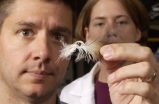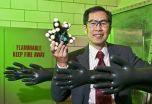(Press-News.org) People are more comfortable committing sins of omission than commission—letting bad things happen rather than actively causing something bad. A new study published in Psychological Science, a journal of the Association for Psychological Science, suggests that this is because they know other people will think worse of them if they do something bad than if they let something bad happen.
"Omissions and commissions come up relatively frequently in everyday life, and we sometimes puzzle over them," says moral psychologist Peter DeScioli of Brandeis University, who conducted the study with John Christner and Robert Kurzban of the University of Pennsylvania. "If a cashier gives you an extra $20 bill at the register, some people think it's okay to keep the money, but many of those people would never just swipe the twenty if the cashier wasn't looking." Psychologists have often thought that this is because the brain makes a mistake; it works through the moral calculations differently when we think about a sin of omission—not giving the $20 bill back—versus a sin of commission—stealing a $20 bill.
But DeScioli and his colleagues suspected otherwise; they thought people were actually making a strategic decision about how to act based on how someone else might judge them. So they set up an experiment that used people recruited through Amazon.com's Mechanical Turk website, which pays people small amounts of money to do tasks. Two or three people were involved in each test. Each time, a "taker" had the option to take part of a dollar away from an "owner"—or to let a 15-second timer run out, in which case the whole dollar was automatically transferred from the owner to the taker, but with a 15 cent penalty leaving the owner with nothing and the taker with 85 cents. Sometimes a third person was involved, to judge the taker's actions and take money away from them for acting badly; sometimes they weren't.
When the takers knew that someone was judging them, 51 percent of participants let the timer run out, even though this was worse for everyone than taking 90 cents; the owner got nothing (instead of keeping 10 cents) and the taker only got 85 cents (instead of 90). This percentage was significantly greater than the 28 percent who let the timer run out when there was no third person judging them.
And it turned out they were right to do that; the third person judged them more harshly if they outright took the 90 cents than if they let the timer run out and deprived the owner of the whole dollar. So people were more likely to do a bad thing by omission if they knew they could be punished for it.
DeScioli says the work will help psychologists sort out the relationship between conscience—the moral decisions you make on your own—and condemnation, the negative judgments made by people who see you act.
###
For more information about this study, please contact Peter DeScioli at pdescioli@gmail.com.
The APS journal Psychological Science is the highest ranked empirical journal in psychology. For a copy of the article "The Omission Strategy" and access to other Psychological Science research findings, please contact Tiffany Harrington at 202-293-9300 or tharrington@psychologicalscience.org.
People would rather let bad things happen than cause them, especially if someone is watching
2011-03-08
ELSE PRESS RELEASES FROM THIS DATE:
Popular drugs for common male health problems can affect their sexual health
2011-03-08
A new study published in The Journal of Sexual Medicine reveals that, for the first time, 5a-reductase inhibitors commonly used to treat urinary problems in patients with benign prostatic hyperplasia (BPH) and found in popular medications to treat hair loss, can produce, persistent erectile dysfunction (ED), depression and loss of libido, even after the medication has been discontinued.
Researchers led by Abdulmaged M. Traish, MBA, PhD, of Boston University School of Medicine, examined data reported in various clinical studies from the available literature concerning ...
Stretchable balloon electronics get to the heart of cardiac medicine
2011-03-08
CHAMPAIGN, Ill. — Cardiologists may soon be able to place sensitive electronics inside their patients' hearts with minimal invasiveness, enabling more sophisticated and efficient diagnosis and treatment of arrhythmias.
A team of materials scientists, mechanical and electrical engineers, and physicians has successfully integrated stretchable electronics technology with standard endocardial balloon catheters. Led by John A. Rogers, the Lee J. Flory-Founder Chair in Engineering at Illinois, the team published its work in the March 6 online edition of Nature Materials.
The ...
New perspective diminishes racial bias in pain treatment
2011-03-08
MADISON — Years of research show black patients getting less treatment in the American health care system than their white counterparts, but a new study suggests that a quick dose of empathy helps close racial gaps in pain treatment.
College students and nurses went to greater lengths to ease the pain of members of their own race in a study led by Brian Drwecki, a psychology graduate student at the University of Wisconsin-Madison.
"I want to be very clear about this: We're not saying health care professionals are racist," Drwecki says. "This is not racism. Racism is ...
DNA better than eyes when counting endangered species
2011-03-08
WEST LAFAYETTE, Ind. - Using genetic methods to count endangered eagles, a group of scientists showed that traditional counting methods can lead to significantly incorrect totals that they believe could adversely affect conservation efforts.
Andrew DeWoody, a professor of genetics at Purdue University; Jamie Ivy, population manager at the San Diego Zoo; and Todd Katzner, a research assistant professor at the University of West Virginia, found that visual counts of imperial and white-tailed sea eagles in the Narzum National Nature Reserve of Kazakhstan significantly underestimated ...
Web use doesn't encourage belief in political rumors, but e-mail does
2011-03-08
COLUMBUS, Ohio – Despite the fears of some, a new study suggests that use of the internet in general does not make people more likely to believe political rumors.
However, one form of internet communication – e-mail – does seem to have troubling consequences for the spread and belief of rumors.
"I think a lot of people will be surprised to learn that using the internet doesn't necessarily promote belief in rumors. Many people seem to think that's self-evident," said R. Kelly Garrett, author of the study and assistant professor of communication at Ohio State University.
"The ...
UCLA researchers use 'nano-Velcro' technology to improve capture of circulating cancer cells
2011-03-08
Circulating tumor cells, which play a crucial role in cancer metastasis, have been known to science for more than 100 years, and researchers have long endeavored to track and capture them. Now, a UCLA research team has developed an innovative device based on Velcro-like nanoscale technology to efficiently identify and "grab" these circulating tumor cells, or CTCs, in the blood.
Metastasis is the most common cause of cancer-related death in patients with solid tumors and occurs when these marauding tumor cells leave the primary tumor site and travel through the blood ...
Story tips from the US Department of Energy's Oak Ridge National Laboratory March 2011
2011-03-08
CYBERSECURITY -- Software agents on assignment . . .
Tracking and protecting information stored on an organization's network could be more secure with a system developed by a team led by Justin Beaver of Oak Ridge National Laboratory's Computational Sciences and Engineering Division. The challenge arises when an organization has documents that are being copied, excerpted, changed and stored in various forms across the organization's network. Host Information Value Engine, dubbed HIVE, solves the problem by dispatching software agents that automatically and quickly review ...
AGU journal highlights -- March 7, 2011
2011-03-08
1. California rapidly depleting Central Valley groundwater
Groundwater is being depleted in California's Central Valley at a rapid rate, according to data from the Gravity Recovery and Climate Experiment (GRACE) satellite. Famiglietti et al. analyze 78 months of GRACE data covering October 2003 to March 2010 to estimate water storage changes in California's Sacramento and San Joaquin River basins. They find that the basins are losing water at a rate of about 30 millimeters (1.2 inches) per year equivalent water height, or a total of about 30 cubic kilometers (7.2 cubic ...
Iowa State, Ames Lab researcher hunts for green catalysts
2011-03-08
AMES, Iowa – L. Keith Woo is searching for cleaner, greener chemical reactions.
Woo, an Iowa State University professor of chemistry and an associate of the U.S. Department of Energy's Ames Laboratory, has studied catalysts and the chemical reactions they affect for more than 25 years. And these days, his focus is on green catalysis.
That, he said, is the search for catalysts that lead to more efficient chemical reactions. That could mean they promote reactions at lower pressures and temperatures. Or it could mean they promote reactions that create less waste. Or it ...
UCLA engineers demonstrate use of proteins as raw material for biofuels, biorefining
2011-03-08
Two types of raw materials are currently used for biorefining and biofuel production: carbohydrates and lipids. Biofuels like ethanol are derived from carbohydrate raw materials such as sugars and lignocellulose, while biodiesels are derived from another raw material, lipid-rich vegetable oil.
In a study published online March 6 in the journal Nature Biotechnology, researchers at the UCLA Henry Samueli School of Engineering and Applied Science demonstrate for the first time the feasibility of using proteins — one of the most abundant biomolecules on earth — as a significant ...


